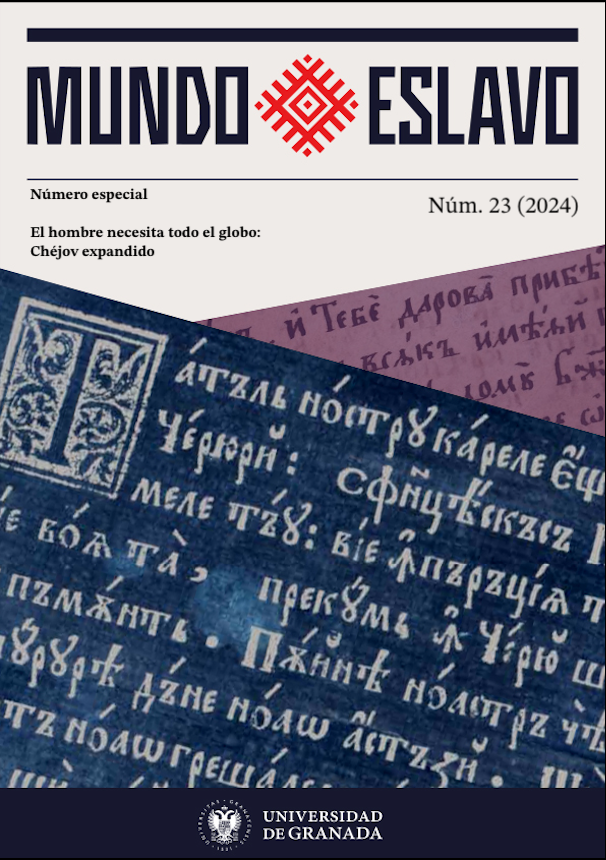The question of ethical responsibility in the fictional narrative "The fatal eggs" by Mikhail Bulgakov
DOI:
https://doi.org/10.30827/meslav.23.30630Ключевые слова:
Булгаков, Роковые яйца, художественное повествование, этическая ответственность, антиутопияАннотация
The question of responsibility regarding the application of scientific research findings extends not only to the scientist who makes a discovery and realizes its potential for practical application but also to those involved in implementing the discovery in practice. Bulgakov's prose "The fatal eggs" underscores these two lines of responsibility associated with ethical considerations. The researcher carefully evaluates potential risks, intends to adhere to precautionary principles, and first seeks to understand the exact mechanisms behind the remarkable results of their accidental discovery. However, the discovery is alienated from them when it falls into the hands of an implementer. This implementer, driven by haste, ideological simplicity, and impatience, fails to consider the principles of experimental work. The discovery, applied inadequately, hastily, and unprofessionally, is thus disqualified and irretrievably lost. Bulgakov's fictional narrative, with its dystopian atmosphere, serves as a poignant warning against unethical practices that can devalue a potentially significant invention, transforming it into an instrument of destruction rather than an asset.
Скачивания
Библиографические ссылки
Bulgakov, M. A. (1989). Rokovye yayca (The Fatal Eggs). In: Bulgakov, M. A. Sobranije sochinenij v pyati tomach, t. II (Collected works in five volumes, vol. II.). Moskva: Khudozhestvennaya literatura, 43–116.
Frei, P. (1932). Wissenschaft und Technik. Eine zeitgemäβe Wisens- und Lebenslehre für jedermann (Science and Technology. A Contemporary Teaching of Knowledge and Life for Everyone). Frankfurt a. M.: H. Buchhold Verlagsbuchhandlung.
Haber, E. (1992). The Social and Political Context of Bulgakov’s ‘The Fatal Eggs’. Slavic Review, 51(3), 497–510.
Jonas, H. (1997). Princip odpovědnosti. Pokus o etiku pro technologickou civilizaci (Responsibility Principle. An Attempt at Ethics for a Technological Civilization). Praha: OIKOYMENH.
Laursen, E. (2012). An Electrician’s Utopia: Mikhail Bulgakov’s “Fateful Eggs”. The Slavic and East European Journal, 56(1), 56–70.
Muránska, N. (2003). Fantastická trilógia Michaila Bulgakova (Fantastic Trilogy by Mikhail Bulgakov). Nitra: Filozofická fakulta Univerzity Konštantína Filozofa v Nitre.
Nida-Rümelin, J. (1996a). Theoretische und angewandte Ethik: Paradigmen, Begründungen, Bereiche (Theoretical and Applied Ethics: Paradigms, Justifications, Areas). Angewandte Ethik. Die Bereichethiken und ihre theoretische Fundierung (AppliedEthics. Domain Ethics and Their Theoretical Foundation) (pp. 2–85). Stuttgart: Alfred Kröner Verlag.
Nida-Rümelin, J. (1996b). Wissenschaftsethik (Ethics in Science). Angewandte Ethik. Die Bereichethiken und ihre theoretische Fundierung (Applied ethics. Domain Ethics and their Theoretical Foundation) (pp.778–805). Stuttgart: Alfred Kröner Verlag.
Nudelman, R. (1989). Soviet Science Fiction and the Ideology of Soviet Society. Science Fiction Studies, 16(1), 38-66.
Ott, K. (1996). Technik und Ethik (Technology and Ethics). Angewandte Ethik. Die Bereichethiken und ihre theoretische Fundierung (Applied Ethics. Domain Ethics and Their Theoretical Foundation) (pp. 652–717). Stuttgart: Alfred Kröner Verlag.
Pešková, M. (2012). Idea „nového člověka“ v ruské literatuře 20. a 30. let 20. století (The Idea of the “New Man” in Russian Literature of the 1920s and 1930s). Plzeň: Vydavatelství ZČU v Plzni.
Tomašovičová J., B. Suwara (2023). Introduction. Transhumanism and Posthumanism in the Perspective of Biotechnologies (7–14). Bratislava: Veda.
Загрузки
Опубликован
Как цитировать
Выпуск
Раздел
Лицензия
Copyright (c) 2024 Mundo Eslavo

Это произведение доступно по лицензии Creative Commons «Attribution-NonCommercial-ShareAlike» («Атрибуция — Некоммерческое использование — На тех же условиях») 4.0 Всемирная.
Los autores conservan los derechos de autor sobre sus trabajos y garantizan a la revista el derecho de ser la primera publicación del mismo. Los artículos se publican bajo la licencia Creative Commons Atribución-NoComercial 4.0 Internacional (CC BY-NC-SA 4.0), lo que permite a los lectores y otros investigadores copiar, redistribuir, remezclar, transformar y construir a partir del material, siempre que se respeten las condiciones establecidas.













